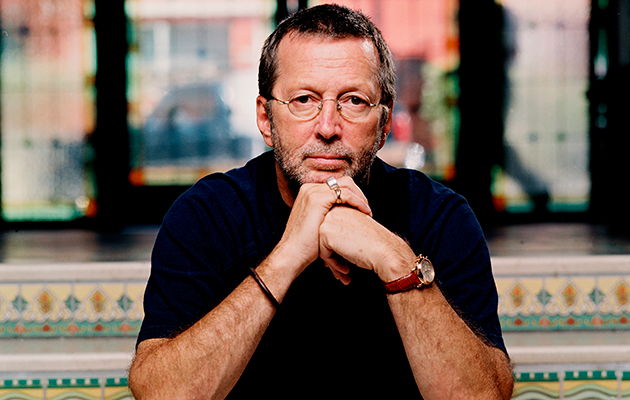When Uncut meets Eric Clapton in the summer of 2014, he has just completed a new album, The Breeze, a tribute to his inspirational old friend, JJ Cale. It soon becomes clear, though, that it’s not just Cale’s death that has put Clapton in a reflective mood. In a frank and moving interview, he confronts the messy past, the stable present, retirement, the prospect of diminishing powers and the reasons why touring has become “unbearable” to him. “In 10 or 15 years’ time,” he says, “driving will have become illegal!” Taken from Uncut’s August 2014 issue (Take 207). Interview: Graeme Thomson
_______________________
‘‘I’m getting old, man,” sighs Eric Clapton, establishing a theme of sorts for the hour that follows, much of which will be dedicated to contemplating the “age thing” from a number of often surprising angles.
Clapton’s new album, The Breeze, a tribute to his late friend JJ Cale, will almost certainly be the last record he releases before he turns 70 in March, 2015. On the cusp of that landmark, and with Cale’s death last year still fresh in his mind, Uncut finds Clapton in unusually reflective mood as he sits down in London to talk through the priorities of a 69-year-old guitar legend in his 51st year as a professional musician. Thoughtful, articulate, and disarmingly honest, he roams over past and present preoccupations, pondering his “selfish pursuits” and musical shortcomings; the “volatile” dynamic of Cream; why touring has become “unbearable”; his physical decline; how marriage has, at last, brought the stability he craved for so long; and whether this has been, all in all, a life well lived.
Certainly, if contentment can be attained through the gradual diminishing of worldly ambition, Clapton seems well on his way to achieving peace of mind. A combination of age and his willingness to embrace his responsibilities as a family man – Clapton married Melia McEnery in 2001, and they have three young daughters – has brought about a clear shift in his priorities. Bluesmen tend to go on for forever; Clapton insists he will not. More than once during a lengthy conversation he brings the subject around to the day – perhaps not so far away – when he will lay down his guitar for good. “I don’t want to have someone come up to me and say, ‘You know what? You shouldn’t be doing this any more’,” he says. “I’d rather come to that conclusion myself.”
These heavy intimations of the beginning of the end of one of the most celebrated careers in rock music lead to careful contemplation of his legacy, but first, there’s the matter of Clapton’s more recent activities. His last album, 2013’s Old Sock, was a gentle stroll through some of his favourite songs by other artists. The Breeze is a similarly retrospective affair, this time focusing on the songs of just one enduring influence. In the press release for the new record he describes his role as that of a “messenger”, an idea that cleaves to the old blues tradition of being an interpreter rather than a writer.



